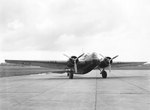B-10
| Country | United States |
| Manufacturer | Glenn L. Martin Company |
| Primary Role | Medium Bomber |
| Maiden Flight | 16 February 1932 |
Contributor: C. Peter Chen
ww2dbaseThe B-10 bombers began their design life as Model 123/XB-10 of the Glenn L. Martin Company of Baltimore, Maryland, United States. The prototype housed a crew of four (pilot, copilot, nose gunner, and fuselage gunner), though for the production version the size of the crew was reduced to three. They were revolutionary in design with all-metal construction, closed cockpits, rotating gun turrets, retractable landing gear, internal bomb bay, and full engine cowlings; these features would become standard for bombers in the decades to come. In 1932, Martin received the Collier Trophy for designing the XB-10. On 20 Mar 1932, little more than a month after the maiden flight, the United States Army Air Corps evalcuated the bomber, and on 17 Jan 1933 an order for 48 units were placed. B-10 bombers entered service in Nov 1934. In early 1935, the US Army ordered an additional 103 aircraft designated B-10B; when they were delivered in Jul that year, they were deployed, among other places, to the Panama Canal Zone and the Philippine Islands. B-10B bombers were 1.5 times faster than any biplane bomber that they replaced, and they were also faster than many contemporary fighters. In 1934 and 1935, the successor design, Model 146, entered into the US Army's long distance bomber design competition, but was defeated by Douglas' B-18 and Boeing's B-17 designs.
ww2dbaseIn addition to the Model 123/B-10 design, Martin also produced the Model 139 design for export purposes, though the US Army retained the rights to the Model 139 design. With upgraded engines, 6 Model 139 bombers were sold to Siam in Apr 1937 and 20 to Turkey in Sep 1937. Other countries that operated Model 139 bombers include the Netherlands, Argentina, and Nationalist China.
ww2dbaseB-10 bombers were seen at the start of the Pacific War. When the Japanese struck Pearl Harbor, three were present. When they were used against the Japanese invasion forces by the Americans in the Philippine Islands and the Dutch in the Dutch East Indies, they proved to be inadequate against modern Japanese fighters. Thus, they were quickly replaced by other designs. In fact, by the time the Pacific War began, the United States Army were already beginning the process to replace them with B-18 Bolo bombers.
ww2dbaseDuring the design's production life, 342 units were built. Of that number, 117 were operated by the US Army and over 200 were exported.
ww2dbaseSource: Wikipedia.
Last Major Revision: Sep 2007
SPECIFICATIONS
B-10A
| Machinery | Two Wright R-1820-33 Cyclone radial engines |
| Armament | 3x7.62mm Browning machine guns, 1,030kg of bombs |
| Crew | 4 |
| Span | 21.50 m |
| Length | 13.60 m |
| Height | 4.70 m |
| Wing Area | 63.00 m² |
| Weight, Loaded | 6,680 kg |
| Weight, Maximum | 7,440 kg |
| Speed, Maximum | 346 km/h |
| Speed, Cruising | 294 km/h |
| Service Ceiling | 7,380 m |
| Range, Normal | 2,200 km |
Photographs
 |  |
Please consider supporting us on Patreon. Even $1 per month will go a long way! Thank you. Please help us spread the word: Stay updated with WW2DB: |
Visitor Submitted Comments
15 Feb 2012 10:27:47 AM
we actually found a original b10 bomber blueprint. took it to two different museums and they verified it was a original...nice piece of history we own :)
5 May 2023 03:38:27 AM
Where can i find the blue print for the B10 ?
5 May 2023 07:19:27 PM
Where can I find blueprints for WH3 version of the B10?
All visitor submitted comments are opinions of those making the submissions and do not reflect views of WW2DB.

- » US State Lawmaker John Winter Caught Using Racial Slur "Jap" and Apologized (11 Jun 2025)
- » Köln/Cologne Evacuated After Discovery of WW2 Bombs (4 Jun 2025)
- » US Women's Army Corps "Six Triple Eight" Awarded with Congressional Gold Medal (30 Apr 2025)
- » Race, Holocaust, and African-American WW2 Histories Removed from the US Naval Academy Library (7 Apr 2025)
- » US Government Plans to Purge WW2 Information (17 Mar 2025)
- » See all news
- » 1,177 biographies
- » 337 events
- » 44,933 timeline entries
- » 1,245 ships
- » 350 aircraft models
- » 207 vehicle models
- » 376 weapon models
- » 123 historical documents
- » 261 facilities
- » 470 book reviews
- » 28,473 photos
- » 365 maps
Winston Churchill, on the RAF
30 May 2011 08:08:36 AM
Looking for ID help of an B-10/12 unit emblem,the emblem is on a round background divided by a half globe in lower and sky upper, in center is the "fuselage" of a Douglas OA-3 with large "Bird" type wings upswept, to the right of the aircraft is the foramtion of either the BIG/Little Dipper and a single star to the left of aircraft, there is an aerial bomb falling below the aircraft on the right . this emblem is on the nose of two B-10/12 aircraft in photo that has men standing in front of them with the patch of the 30th Bombardment squadron which was part of the 19th Bombardment Group, i think it may have been atMarch Field or possibly taken on the "Alaskan" flight of B-1o/12's that flew there, if anyone recognizes this emblem Please contact me , thank you very much !!!!!!!!!
Johnny
WeBeEmblems(at)aol.com